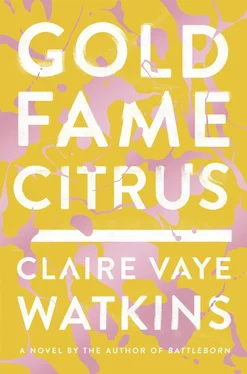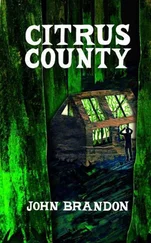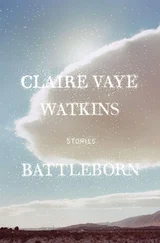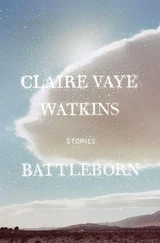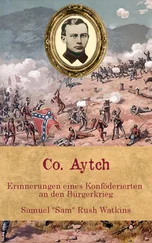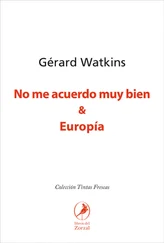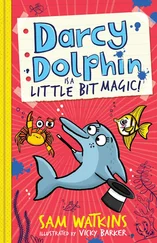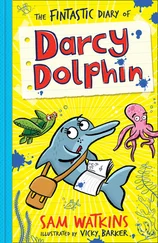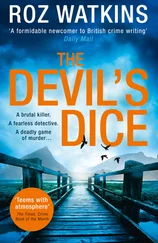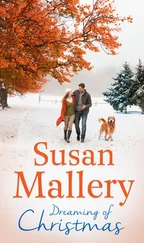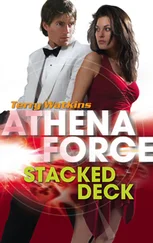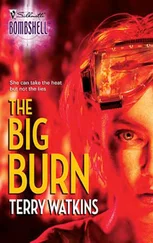They took a bald dirt track eastish. Promising for miles, until it was bisected by an ancient gully, its bed loaded with head-size boulders. Ray skidded the Melon to a stop. “We won’t make it,” he said.
He looked as if he might cry, or shatter the too-close windshield with his hand. Ray’s deflating faith was terrifying. Disbelief was Luz’s way. Or rather Luz believed only the most absurd Disney fantasies — the canyon menagerie, the Hollywood escape — so that their failure to materialize was proof that all things would always fail to materialize. She could certify sinkholes, arsenic poisoning, a world of hot undrinkable brine. But where her mind was miserly, Ray’s heart had room for all things, all modes of being, for water and for the promises of coins. He was, she realized, the essential opposite of her father, whose meanness and fear she’d inherited, though none of his industry. How sustaining it might have been to have that room, to not be ever at capacity. The ultimate project: to believe. That way, when the day came — through some fermentation of will and time and miracle — when the three of them emerged from this desert and Ig plumped and spoke and lined her dolls along a windowsill and asked, “Where did I come from?” faith would surely, if Luz could begin to cultivate it now — no, cultivate was not the right word. One didn’t cultivate faith and one did not cultivate anything here, save thirst and thirst and insanity. But if she might have somehow by then made room in herself, might have evicted the photographers perhaps, erased the year she probably should have followed her agent to New York, the year she was twenty-two but writing seventeen on all her forms, faith or belief might have let her respond, without saccharine or strychnine, “God gave you to us.”
“We can make it,” Luz said. She cajoled Ig’s limbs through their straps and buckled the apparatus over her despite the child’s whining. “Go,” she said, “before she has another meltdown.”
Ray nodded. The Melon plunged into the wash, the three of them lurching within. Rocks pinged violently up into the undercarriage. The Melon’s European engine whirred as her wheels spun frantically in the detritus, then caught, miraculously, ejecting the car up and out of the wash. Ray and Luz cheered. Ig cried until Luz freed her and reinstalled her on her lap. Luz held Ig, smelling the slight scabby smell of her head as the trail dipped dramatically and the desert scrub shrunk away and the trail went bankless, stretching now through a vast blinding rockscape. Luz had never seen anything like the craggy bleached white rocks rippling along the side of the trail, like water froth made inanimate, capped here and there with daubs of brown.
The sun was at its perfect apex, which it seemed never to leave. Beyond them, the blurry summits of the dunes in the distance blazed as if they made their own light. Down and down they sank, and the blanched, calcium-crusted oven of the valley broiled. Luz remembered something from her father’s idea of school, stacks of outdated trivia cards skewered on rings by subject: the lowest point in the US? Badwater. She was drinking more than her share.
She helped Ig drink, too, though still she spilled. “I’m good,” Ray said too pleasantly when she offered. Soon, Luz had to pee.
“Low on gas anyway,” said Ray, chewing at the skin beneath his nails. They were facing south now — she was almost positive — though they did not acknowledge this between them.
Luz set Ig down so she might waddle around, burn off some energy. “You have her?” she confirmed, fearing the little one impaled by the jagged rock pinnacles jutting skyward in crags like parched coral. And like something once alive, the rocks crunched under her feet, more delicate than rock ought to be. She squatted, hanging her head to look between her splayed feet. She grasped a spire for balance, prepared for it to burn her. But instead, the spire snapped off in her hand. She caught herself and looked to the crushed filtrate glittering uncannily. Teeny honeycomb crystals in her palm. She peed and watched between her legs in awe as her near-brown urine melted a tunnel in the rock. She finished, shook her rump in the air diligently and on her walk back found a pure white fist-size crystal. She licked it.
“It’s salt,” she said, marching clumsily back to the car. “It’s all salt. Ray, taste.”
Ray had opened the hood of the Melon and was leaning inside with his shirt off, as if the little coupe was politely eating him. Ig was stooped in one of the ruts of the trail, collecting little somethings in her hand. Luz approached Ray with the rock outstretched but he did not look to her. In the dark shadow of the hood his back was angry — cords in his neck and throat pulled taut, the flanks spread across his shoulders drawing his scapula up around his ears. Obviously not the time, and she congratulated herself for realizing this. She would go show Ig instead. But before she could turn and leave Ray to his trouble, whatever it was, a scent dizzying and unmistakable confronted her: gasoline.
She covered her mouth with her free hand, tasting somewhere beneath her dread and horror the salt residue there. “What happened?”
“Gas tipped over. When we went through that gully.”
She put the salt crystal to her side, not sure whether to drop it — too melodramatic — or hold it until it dissolved in her fist. “Jesus.”
“The lid was off.”
Their last stop. She’d pried the plastic cap from the Sparkletts bottle and whiffed from it so as not to accidentally fill their drinking jugs with gas. She’d congratulated herself, scooting the gasoline aside and reaching for water instead, silently commended her own prudence while neglecting to replace the cap. Now, a clear, greasy crescent of the fluid swayed in the once-full bottle where it lay on its side, scarves and baby clothes and adult clothes soaked, the carpets glistening with fuel.
“I’m sorry,” she said.
“Me too. That was our last one.”
“What do we do? Turn around?”
“We’ll never make it through that gully from this side. Even if we did.”
“So, what? Keep going?”
“Maybe there’ll be a road.”
“How far can we get?”
“Not far.”
Then what? no one said.
—
They went on, the journey a stillborn they had to birth. The Melon’s steering wheel was a simple chrome circle — surely blisteringly hot, though Ray said nothing — with another half circle of chrome upturned inside it like a smile. The speedometer, notched with kilometers, was one eye and the other, a little smaller, was a clock stuck near three thirty. Onward they rolled, no need for speed now, through the salt fields, quiet except for the crunch of the trail and Ig whispering her Ig language. The steering wheel face grinned at them idiotically, maniacally, while Luz and Ray silently watched its third eye, the gas gauge, tick nearer and nearer the orange hash marked R .
“What do you think that stands for?” asked Ray after some time.
“Does it matter?”
“I’d like us to explore it.”
“Are you doing the thing where you ask questions just to be talking?”
“Yes.”
She sighed. “Refill.”
“Reserves,” he said.
“Replenish.”
“Rejuvenate.”
“Regenerate.”
“Regurgitate.”
“Reinstate.”
“Reject.”
“Restore.”
“Rejoice.”
“Reconnoiter.”
“Rescue.”
“Residue.”
“Roam.”
“Rome.”
“Romans.”
“Romance.”
“Remnants.”
“Run.”
“Rest.”
The salt rock was still in her hand somehow, but the salt fields were behind them, and Luz did not notice when they left them and so she did not get to say good-bye, and wasn’t that her shallow, selfish way? Before them was the dune: magnetic, candescent, on three sides of them, as consuming as sky. The needle leaned on R , now engorged with denotation. The trail narrowed. Shallow, boiling pools came up on either side, their waters fluorescent yellow, stinging to the eye. The smell of rotten eggs seeped into the car.
Читать дальше
